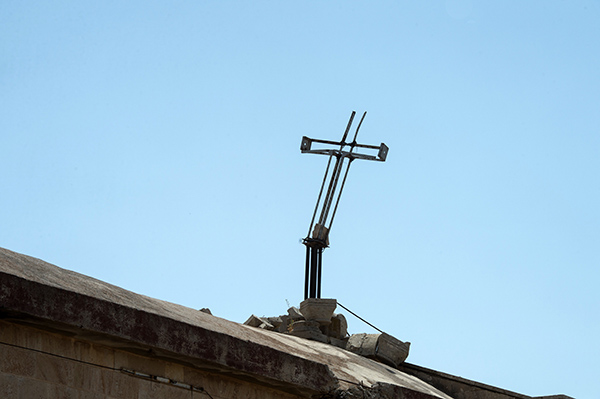
By Elise Anne Allen
ROME (Crux) – Despite widespread speculation that Pope Francis and top Shi’a cleric Grand Ayatollah Al-Sistani will sign a document on human fraternity during their meeting in Iraq next month, an Iraqi state official has said the rumors are false.
According to the Iraqi Kurdish news site “Rudaw,” in comments made during a media roundtable, Senior Undersecretary of Iraq’s Ministry of Foreign Affairs Nizar Al-Khair Allah called the Holy Father’s scheduled visit with Al-Sistani “historic.”
A visit like this “has not been witnessed in the history of the Hawza,” he said, referring to a prestigious seminary for Shi’a clerics, “but it won’t include any signings or agreements.”
Pope Francis is set to meet Al-Sistani March 6 as part of his 4-day visit to Iraq, during which he is expected to make stops in Baghdad, Erbil, Qaraqosh, Mosul, the Plain of Ur, and Najaf, where Al-Sistani lives.
For some weeks it has been rumored that during his private meeting with Al-Sistani, the two would sign the Document on Human Fraternity, originally signed by Pope Francis and the Gran Imam of Al-Azhar, Ahmad Al-Tayyeb, during the pope’s visit to Abu Dhabi in 2019.
However, Khair Allah’s statement that there will be no agreements made or document signed appears to debunk that rumor. Al-Sistani himself, who is 90, does not usually leave Najaf and rarely receives visitors, making his conversation with the pontiff even more significant.
In his remarks to state media, Khair Allah also said the pontiff would be provided local security, saying, “The Vatican would like Pope Francis to come via an Iraqi plane with the provision of Iraqi protection.”
Although the trip is less than a month away, some have speculated whether the visit will actually take place, with security being one of the top concerns in addition to the ongoing impact of the COVID-19 pandemic.
Initially an alarm was raised in January when two ISIS suicide bombers at a crowded market in Baghdad claimed dozens of lives. Since then, there have been periodic rocket strikes in residential areas of Erbil, raising concern that more attacks could take place as the papal visit gets closer.
The latest of these rocket attacks took place Feb. 15, when a barrage of rockets targeted the main military base inside Erbil’s airport. Among other things, the base hosts foreign troops deployed as part of the US-led coalition helping Iraqi forces to fight ISIS.
However, not all of the rockets hit their target. Several struck portions of Erbil’s northwestern sector, killing one foreign civilian contractor and wounding at least nine others, including an American soldier.
A group that calls itself “Awliya al-Dam,” meaning “Guardians of the Blood,” claimed responsibility, saying it would continue to attack the American “occupation” forces in Iraq.
After the incident, senior Iraqi Shi’a cleric and leader of the country’s Sadrist Movement, Muqtada al-Sadr, said he believes the rocket strike was launched in a bid to either cancel or postpone Pope Francis’s March visit, which would mark the first time a pope has ever set foot in the country.
Sadr said it is now the government’s task to deal with any security concerns with “caution and wisdom.”
Immediately after Monday’s rocket attacks, rumors began circulating in local media that the papal visit would be postponed, however, the Vatican’s ambassador to Iraq, Archbishop Mitja Leskovar, denied the reports, saying in a statement that “in some Arabic media is circulating a fake news that Pope Francis is delaying his visit to Iraq. The truth is that it remains scheduled from 5-8 March 2021.”
Iraq’s Ministry of Foreign Affairs also quickly put out a statement promising action, saying, “the government will take all means to fight the remnants of terrorism in any form and under any name and is determined to continue the war against these groups.”
In an interview with Vatican News, Bishop Basel Yaldo, an auxiliary bishop in Baghdad and general coordinator of the papal trip, said Iraqis are awaiting the pope “with all our hearts.”
“For decades, we have been waiting for a pope. For us, it will be a truly historic event,” he said, adding that after decades of war and violent conflict, the people want peace, “and we are sure that Pope Francis’s visit will bring hope to all Iraqis, not just Christians.”
Pope Francis’s visit comes at a time when many experts and observers fear that it is only a matter of time before Christianity disappears from the Middle East entirely.
In Iraq alone, hundreds of thousands have left in recent years as a direct result of war, discrimination, violent persecution, and poverty. As of 2003, there were roughly 1.5 million Christians in Iraq, while today that figure is closer to just 300,000.
In his comments, Yaldo said that when the pope visits the villages burned and pillaged during the ISIS insurgency on the Nineveh Plain, he will bring the solidarity of the entire Church with him, and a prayer for unity.
All papal events, he said, will show that the pope is coming “for all the people of Iraq, without any distinction.”
